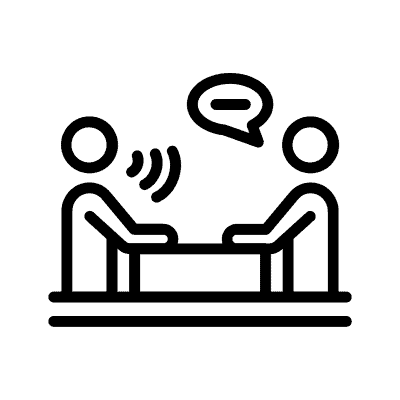People seek out life coaching and therapy for similar reasons: to improve their lives. While coaching tends to have a specific focus, such as business, health, relationships, or goal-oriented strategies, therapy aims to improve overall mental health.
One does not have to choose coaching over therapy. They can be done in conjunction or during different phases of life. This article will explore the differences and similarities, when coaching makes more sense, and when therapy is the better choice.
Coaching vs. Therapy: Main Differences
One of the most critical distinctions between coaching and therapy is the practitioners’ credentials. Therapists must have, at a minimum, a Master’s Degree in either Social Work, Psychology, or Professional Counseling and pass a state board exam for licensure. Some therapists also have a Ph.D. in psychology and may be licensed as a psychologist.
To keep their therapy licenses valid, therapists must complete continuing education credits every couple of years. In most states, therapists must have at least 3000 supervised hours of clinical client experience before they can take their state exam. It takes many years to become a licensed therapist and several more to become a licensed psychologist (Ph.D.).
Since no legal regulatory board oversees coaching, anyone can call themselves a coach. While this might instill fear when considering hiring a coach, the International Coach Federation does offer certification to educational programs they believe meet the requirements to train coaches.

Programs that certify those wanting to become a life coach vary widely. Some life coaches can become certified after a weekend workshop, whereas others graduate from year-long programs.
Another significant difference between coaching and therapy is that therapists diagnose and treat mental health issues. Life coaches cannot legally diagnose or treat mental health issues. Mental health treatment is often covered by insurance, whereas life coaching is not since it is an unregulated industry.
Lastly, a big difference between these two industries is that life coaches help keep their clients accountable by frequently checking in with them. The life coach’s job is to essentially keep their client on track. A therapist wants their client to hold themselves accountable and help instill a sense of self-reliance rather than rely on the therapist to keep them accountable.
Coaching vs Therapy: Similarities
Coaching and therapy both serve to improve people’s lives. Whether you are working with a coach or a therapist, both will want to help establish achievable goals. Typically, people seek coaching or therapy when they need objective support or have tried to improve their circumstances but can’t reach an optimal solution or goal.
When to See a Therapist
The best indicator to know if you need a therapist is if you feel you are struggling with something in life that feels vague and overwhelming. In other words, there isn’t one specific identifiable issue with an exact cause and effect. Therapists have the skills, knowledge, and training to help you identify what might be troubling you, treat the symptoms, and achieve mental health goals.
When to See a Life Coach
When a person wants to address a specific aspect of their life and meet an established goal, a life coach can help. Let’s say, for example, the client has trouble making friends. Life coaching would look at what might be causing this challenge, establish behavioral changes to improve the chances of making friends and set goals for achieving more friendships.

I’m Feeling Anxious, Which One to Choose?
If you are experiencing a general sense of anxiety, it’s best to see a therapist. A therapist can help analyze and identify what may be contributing to a general sense of anxiety. They are skilled at identifying signs and triggers of anxiety and can help treat anxiety.
If your anxiety is related to a specific issue like public speaking, a life coach may be a great choice. Together, you might work on building skills for public speaking and taking small steps to implement these changes. You might have a goal to speak at an open-mic coffee shop event and work your way up to making a speech at an industry event.
I’m Feeling Sad, Which One to Choose?
If you are feeling a general sense of sadness, therapy is the best choice. It’s common to feel sad and not know why or what to do about it. A therapist can help assess what may contribute to these feelings and help treat the symptoms.
If you know why you are sad, maybe a recent job loss, a life coach might help establish small, achievable stepping-stone goals to move you from jobless and unhappy to content and employed.
I’m Feeling Stressful, Which One to Choose?
If you are feeling stressed and overwhelmed, therapy can help. A therapist can help you determine what contributes to this stress and how to adjust your life accordingly.
If you are stressed because of a specific challenge, such as not being able to afford a car to get to work, a life coach might be helpful. Together, you can set a goal to save money to buy a new car, and they can help keep you accountable and on track.
Seeing a Life Coach Tips
Only hire life coaches who are certified by the International Coach Federation. This implies they have had sufficient education and training to be a coach. In addition, inquire about their length of experience, what type of clients they serve, and how they work with clients.
Seeing a Therapist Tips
Preferably, the therapist has been licensed for a few years. Ask about their experience and what client issues they specialize in. Inquire about their methods of treatment. If they give you vague answers, keep looking for another therapist. A skilled and seasoned therapist should be able to answer your questions clearly and concisely.
Conclusion
Life coaches and therapists help clients live more fulfilling and happier lives. A life coach might be a good choice if you are experiencing a specific challenge and need support, accountability, and help setting goals. On the other hand, if you feel overwhelmed by several challenges, aren’t sure what’s causing you discomfort, and can’t seem to find a solution, therapy is the better choice.
Clients can go to therapy and seek assistance from a life coach. Often, these two are complementary interventions for clients. Whatever you decide, know that there is support available.





